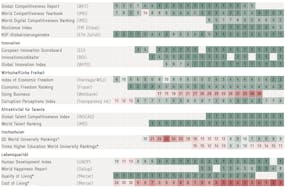During his visit to Switzerland as member of a distinguished business delegation, Roger Partridge, Chairman of the New Zealand Initiative think tank, also met with Avenir Suisse and concluded that New Zealand can learn from Switzerland in three policy areas: housing, governance, and higher education. While Switzerland does many things correctly, including maintaining government as local as possible, not everything in the policy areas Roger Partridge uses as examples, is as good as it looks. To be prepared for the next challenges, Switzerland must do better.
Last month the New Zealand Initiative, our sister think tank from New Zealand, did us the honor of visiting us with a high level business delegation. It was a distinguished delegation. Almost forty New Zealand business leaders – among them Air New Zealand’s CEO Christopher Luxon, ASB Bank’s CEO Barbara Chapman and Mercury’s CEO Fraser Whineray – travelled to Switzerland for a week of discussions with various interlocutors in order to learn more about our country’s recipe for success. Obviously, Avenir Suisse, was happy to share one morning with our think tank colleagues at our offices in Zurich. It was a great opportunity to discuss and compare Swiss and New Zealand policies.

Sheep traffic jam near Patearoa. (Wikimedia Commons)
Back home in Wellington, Roger Partridge –Chairman of the New Zealand Initiative and head of the delegation – presented his overall conclusions on the mission led in Switzerland («Unusual Business in Switzerland»).
A Flattering Report from New Zealand
As a Swiss, one can only feel flattered by Roger Partridge’s considerations.
In his back-to-office report, he argues that New Zealand has much to learn from Switzerland in three policy areas: housing, governance, and education. Avenir Suisse fully agrees that we live in a great country. Indeed, we do many things correctly in Switzerland. As a result, our country is well organized, beautiful, safe, and peaceful and – consequently – we enjoy a level of prosperity that, given our natural preconditions, can by no means be taken for granted.
However, as true patriots, precisely because this prosperity cannot be taken for granted, Avenir Suisse also believes that there is no greater enemy than complacency. As in any sports, a player is only as great as they are for their next game. It is precisely for this upcoming game that any country must prepare. Sitting back in contentment will not ensure a glorious future. With this spirit in mind, I will show how there is room for improvement (even) for Switzerland, in the three policy areas Roger Partridge elaborated.
Housing
Roger Partridge argues that, in contrast with New Zealand’s housing market, Switzerland’s has kept up effectively with an impressive surge of immigration. House price inflation in Switzerland, the argument goes, is well below New Zealand’s level, due to local competencies in planning and development.
While I fully agree with the benefits of local government and subsidiarity (more on that below), not all is well in the Swiss housing market. As Avenir Suisse’s Patrik Schellenbauer explains in «Migration, Housing, and Prosperity» (available only in German), the rental property market (most Swiss live in rented properties) is highly regulated. Basically, rents are linked, by law, to the cost of real estate owners, thereby impeding rents’ signal as scarcity indicators. This leads to a split in the market for rented property between a high priced sector of new real estate on the market and a heavily restricted low price sector of incumbents, with the concomitant symptoms of long waiting lists, under-occupancy, and low market liquidity. Moreover, construction regulation offers unintended incentives in many cities and communes, resulting in urban sprawl. For example, Zurich, Switzerland’s largest city and economic power house, only has one high-rise with building activity sprawling into the suburbs. Obviously, prosperity-oriented housing and construction policies are necessarily more market-oriented. Only these can effectively address the current ills of real estate markets and the present-day wasteful use of economically and ecologically valuable land in Switzerland.
Governance
A decentralized government that follows the principle of subsidiarity – competency and responsibility at the lowest possible level of government – leads to superior results compared to purely centralized government. I could not agree more with Roger Partridge, because a government organized according to subsidiarity, is closer to its citizens’ preferences than in a centralized government. Indeed, in his piece he convincingly argues that New Zealand could greatly benefit from devolving more powers to the Councils. Notably, real estate development would greatly benefit from giving the Councils the right to raise and spend tax revenues themselves.
Switzerland is indeed great when it comes to subsidiarity and fiscal federalism. However, even in our great country, this superior system is an endangered species. As Avenir Suisse’s Lukas Rühli and Natanael Rother demonstrate in «NFA 2 – Towards a Revitalization of Swiss Federalism», a web of fiscal transfers going back and forth between cantons and the Confederation continues to exist. Moreover, the system is under constant attack of pervasive cravings for centralization from various interested parties. This creates unintentional incentives resulting in overspending on certain government services, such as large local infrastructure projects, and underspending in others. Smart government-oriented governance would revitalize Swiss federalism by handing back many tasks to the cantons, together with the right and duty to fund them. The existing national equalization mechanism – an overall economically sound instrument – should then comprehensively and exclusively deal with cantons’ disparities in resources and burdens.
Higher Education
Roger Partridge further argues that New Zealand’s education system compares unfavorably with Switzerland’s, in particular with regard to tertiary education. Again, I fully agree that our dual track system successfully ensures that higher education opportunities are available not only for graduates from the traditional middle schools, but also for those who started out on the vocational training track (apprenticeships). Every smart mind can therefore benefit from an opportunity and productivity enhancing tertiary education.
Indeed, Switzerland has invested considerably into this system. The federal government and the cantons spend more than CHF 1.8 billion (2015) annually on the polytechnic schools and an additional CHF 6.8 billion on public universities. In principle, investment in education is money well spent. However, do we get as much as possible from these considerable resources? As Avenir Suisse’s Patrik Schellenbauer notes in “Combining efforts for Switzerland’s higher education system”, no less than 62 Swiss cities boast higher education institutions in a country of roughly 40’000 square kilometers and a population of about 8.5 million. Moreover, the institutions’ programs offer surprisingly little diversity giving the impression that all institutions struggle to provide a full range of studies.
This duplication of efforts suggests that by combining energies and thereby benefiting from specialization and economies of scale, more could be done with such generous resources in higher education. The next generation’s education is such a valuable resource that no single franc should be wasted.
Agriculture
Finally and in addition to Roger Partridge’s considerations, New Zealand is a stellar performer where Switzerland is unfortunately at the bottom of the rankings: Switzerland’s agriculture holds the uncontested record, among OECD countries, for government support, including of the highly distorting sort. New Zealand has not always had such a performing agriculture. As in other OECD countries, New Zealand’s agriculture has also been heavily buttressed by the government. Nonetheless, New Zealand turned its agriculture from a drag on the government’s budget into a globally competitive and highly profitable sector. As the New Zealand Initiative’s presentation at Avenir Suisse showed, this was by no means obvious at the time. But then many things seem impossible until they are done.
There is no need for Switzerland’s agriculture to become like New Zealand’s. But there is no necessity either to be the world champion in expensive and distortive government support.
In conclusion, I fully agree that Switzerland is a great country. But this is the result of the last few successfully played games. Instead of folding our hands in contentment, we must now prepare Switzerland for the next challenges in order to remain a prosperous and great country. The three areas discussed above, among others, clearly offer room for improvement.





